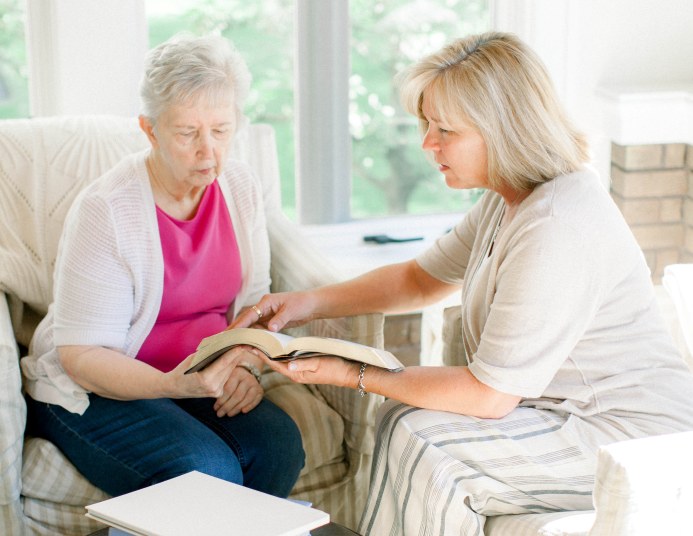How to Recover From Caregiver Burnout

Being a caregiver is a challenging job. You’re on-call 24/7 to care for your loved one, all while trying to maintain your job, family, and life. And even if you do get a few moments to yourself, you’re likely stressed about your loved one being alone or not in your immediate care. After a while, you start to feel burned out, and you’re probably hard on yourself, believing you should be able to juggle everything that life throws at you.
Recovering from caregiver burnout is essential to you and your loved one’s health. The better you feel, the easier it will be to care for another person. When you’re tired, things can begin to slip. Joyful Companions understands caregiver burnout, which is why we do what we do. Here are some suggestions for recovering from caregiver burnout.
Acknowledge Your Burnout
The first step is to recognize your burnout. It is a common issue and does not reflect on you as a caregiver. It is certainly not a weakness. Burnout not only affects your ability to be a caregiver, but it can affect other personal relationships. Burnout can affect your mental and physical health as well.
Admit to yourself that you need to rest and recover– which can take a lot of courage. Just admitting it can give you a measure of relief because you can take the necessary steps to recover.
Practice Self-Care
Practicing self-care is important no matter what is happening in your life. You’ve likely been sidelining your self-care in favor of ensuring your loved one is well cared for. But it’s time to turn your attention to yourself.
Self-care can take many forms, including meditation, yoga, breathing exercises, a hot bath, or relaxing on the couch watching your favorite show. There are no guidelines for self-care; do what makes you happy and comfortable.
Set Boundaries
Setting boundaries is a difficult thing to do for many people. You’ve been giving so much of yourself to another person that setting a boundary feels like neglecting that person. That’s not true. Setting boundaries between your caregiving role and personal life can help you avoid overextending yourself. Your entire identity does not have to revolve around being a caregiver.
Ask for Help and Support
If you are the sole caregiver for another, it’s time to ask for help. If you can, delegate some of your responsibilities to others willing to step in and help. Create a detailed schedule to manage responsibilities and time more efficiently. Prioritize what you can and let others assist you.
If you don’t have anyone to lean on for support, you may want to consider hiring professional help. Professional caregivers can take on some of your responsibilities and act as an extra set of eyes on your loved one. There are people in this world who feel joy in caring for others, so let them help you out. You can also consider respite care to give you a break.
5 Signs You Need Respite Care
Respite care is crucial for recovering from caregiver burnout. It can provide temporary relief from your responsibilities so you can focus on yourself for a while. Respite care is a lifeline that balances your caregiving responsibilities with your need to take a break. Respite care can improve you and your loved one’s quality of life, reduce stress, and provide professional care. Non-medical in-home care has many benefits as well.
It’s not uncommon to feel nervous about allowing someone else to care for your loved one. It’s possible you feel self-conscious about hiring additional care for your loved one. Outsider opinions on how you care for your loved one shouldn’t be a factor in making the best decisions for you and your loved one. Not everyone understands the role of a caregiver, but you do. Never be afraid to ask for help.
Here are some signs that you need to hire respite care.
You’re Overwhelmed and Exhausted
If you feel a deep sense of exhaustion in your bones, you are exhausted and overwhelmed with your role as a caregiver. Your mind and body struggle to keep up with your responsibilities and personal life. Exhaustion and feeling overwhelmed can negatively impact your mental and physical health, so you’re not in top shape to care for another person.
You’re Feeling Isolated
Caregivers can often feel isolated because of their responsibilities. If you feel lonely or cut off from your friends and family, respite care can give you a break to spend some social time with others.
You’re Feeling Resentful or Guilty
If you’ve been a caregiver for a long time, then you might feel a creeping sense of resentment or guilt. You might feel resentful toward your loved one, which can make you feel guilty at the same time. This is a major sign that you need a break and allow respite care to take over for a short time.
You’re Neglecting Your Health
You can’t burn a candle at both ends. If you neglect your health, you can’t adequately care for another person. This can include missing or avoiding doctor appointments, forgetting your medications, or feeling ill most of the time.
You’re Concerned for Your Loved One
If your loved one’s health is declining and requires extra attention and care, then respite care can be a huge help. It is very difficult to manage that amount of care while balancing your personal life. If you need additional support, reach out.
Joyful Companions Can Give You a Break
Joyful Companions is a faith-based organization dedicated to providing non-medical in-home care and respite care for your loved ones. We’ve been helping Minnesotans since 2007, providing the best care and support to caregivers and their families. Allowing someone to take a load off of your shoulders is crucial– so let Joyful Companions be those helping hands. Call us today at 763-544-0401 or schedule a free in-home consultation online.